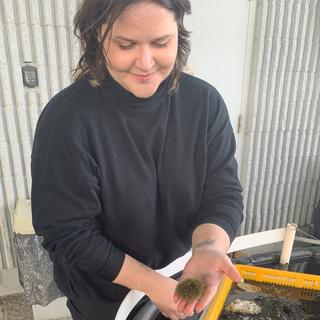Through DNA analysis, VIU researchers determined that Vancouver Island wolverines are not a distinct subspecies from those found on the mainland in North America.
Scientists and conservationists have been questioning for decades whether wolverines on Vancouver Island are a distinct subspecies from those found on the mainland in North America.
The answer to this question is critical because wolverine populations have been declining in BC and the Vancouver Island wolverine, Gulo gulo vancouverensis, is red listed by the BC Government, which means the species is considered threatened or at risk of being lost to extinction. The last confirmed sighting of a wolverine on Vancouver Island was in 1992.

“The Committee on the Status of Endangered Wildlife in Canada has cited concerns about wolverines declining across BC and whether the Vancouver Island wolverine really was a unique subspecies that has been lost to extinction or if they were the same subspecies as is found on the mainland,” says Dr. Jamie Gorrell, a Vancouver Island University (VIU) Biology Professor. “While losing wolverines from Vancouver Island is bad news for the conservation of biodiversity, the extinction of a unique subspecies means losing something that can never be replaced.”
Scientists and researchers now have an answer to this question thanks to VIU researchers Evan Hessels, a VIU alum who graduated with a Bachelor of Science in Biology in 2019, and Gorrell.
“To determine the genetic difference between Vancouver Island and mainland wolverines we collected tissue samples from known Vancouver Island wolverine specimens in museum collections across North America,” says Hessels. “These samples were primarily taken from bones and under the fingernails of tanned pelts, some of which were close to a hundred years old. DNA was extracted from these samples and then compared to that of wolverines from the mainland to determine if any major differences could be found between the populations.”
The DNA comparisons showed that the genetic difference was very small and not enough to consider wolverines on Vancouver Island a unique subspecies. Resolving the question about whether Vancouver Island wolverines are a distinct subspecies now allows for potential conservation efforts to relocate mainland wolverines to Vancouver Island. However, reintroducing wolverines to the Island could result in other consequences to biodiversity.
“While wolverines from the mainland could be reintroduced to Vancouver Island, this could be dangerous for the survival of the Vancouver Island marmot, which is the most critically endangered mammal in Canada,” says Gorrell.

Hessels and Gorrell present their findings in an article, “Characterizing the elusive Vancouver Island wolverine, Gulo gulo vancouverensis, using historical DNA,” which was co-authored by Eric Lofroth from Boreas Ecological consulting, and Rich Weir from the BC Ministry of Environment and Climate Change Strategy. The article was published in the Journal of Mammalogy on January 31, 2021.
“I am very excited to have my research published in the Journal of Mammalogy. I hope this research helps contribute to the conservation of wolverines moving into the future,” says Hessels.
Hessels completed his DNA analysis as part of his fourth-year undergraduate research project in April 2019. He is also the recipient of a VIU REACH Award, which provides students with a stipend to help them complete their own independent research project under the mentorship of a VIU faculty member. This project was funded by a VIU Inquiry Grant and a Natural Sciences and Engineering Research Council of Canada Discovery Grant, awarded to Gorrell.
-30-
MEDIA CONTACT:
Rachel Stern, Communications Officer, Vancouver Island University
C: 250.618.0373 l E: Rachel.Stern@viu.ca | T: @VIUNews





